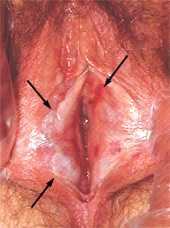Table of Contents
Basic Information About Vaginal and Vulvar Cancers
When cancer starts in the vagina, it is called vaginal cancer. The vagina, also called the birth canal, is the hollow, tube-like channel between the bottom of the uterus and the outside of the body.
When cancer forms in the vulva, it is vulvar cancer. The vulva is the outer part of the female genital organs. It has two folds of skin, called the labia. Vulvar cancer most often occurs on the inner edges of the labia.
Vaginal and vulvar cancers are very rare. While all women are at risk for these cancers, very few will get them.
What Are the Risk Factors?
There is no way to know for sure if you will get vaginal or vulvar cancer. Some women get these cancers without being at high risk. However, several factors may increase the chance that you will get vaginal or vulvar cancer, including if you—
- Are infected with certain types of human papillomavirus (HPV) for a long time.
- Have had cervical precancer (cell changes that might become cancer if they are not treated appropriately) or cervical cancer.
- Have had vulvar or vaginal precancer.
- Have a condition that weakens your immune system (such as HIV, the virus that can lead to AIDS), making it hard for your body to fight off health problems.
- Smoke. Among women who have an HPV infection, smoking may prevent the body’s immune system from getting rid of the HPV infection.
- Have chronic vulvar itching or burning.
If one or more of these things is true for you, it does not mean you will get vaginal or vulvar cancer. But you should speak with your doctor to see if he or she recommends more frequent exams.
What Can I Do to Reduce My Risk?
The HPV vaccine protects against the types of HPV that most often cause cervical, vaginal, and vulvar cancers.
- HPV vaccination is recommended for preteens aged 11 to 12 years, but can be given starting at age 9.
- HPV vaccine also is recommended for everyone through age 26 years, if they are not vaccinated already.
- HPV vaccination is not recommended for everyone older than age 26 years. However, some adults age 27 through 45 years who are not already vaccinated may decide to get the HPV vaccine after speaking with their doctor about their risk for new HPV infections and the possible benefits of vaccination. HPV vaccination in this age range provides less benefit, as more people have already been exposed to HPV.
If vaccination is started before age 15, a two-dose schedule is recommended, with the doses given 6 to 12 months apart. For people who start the series after their 15th birthday, the vaccine is given in a series of three shots.
HPV vaccination prevents new HPV infections, but does not treat existing infections or diseases. This is why the HPV vaccine works best when given before any exposure to HPV. You should get screened for cervical cancer regularly, even if you received an HPV vaccine.
What Are the Symptoms?
Vaginal Cancer
Early on, most vaginal cancers do not cause signs and symptoms. But if there are symptoms, they may include—
- Vaginal discharge or bleeding that is not normal for you. The bleeding may be abnormal because of how heavy it is, or when it happens, such as bleeding after you have gone through menopause; bleeding between periods; or any other bleeding that is longer or heavier than is normal for you.
- A change in bathroom habits, such as having blood in the stool or urine, going to the bathroom more often than usual, or feeling constipated.
- Pain in your pelvis, the area below your stomach and in between your hip bones, especially when you pass urine or have sex.
Vulvar Cancer
Many women who have vulvar cancer have signs and symptoms. They may include—
- Itching, burning, or bleeding on the vulva that does not go away.
- Changes in the color of the skin of the vulva, so that it looks redder or whiter than is normal for you.
- Skin changes in the vulva, including what looks like a rash or warts.
- Sores, lumps, or ulcers on the vulva that do not go away.
- Pain in your pelvis, especially when you urinate or have sex.
It is important for you to pay attention to your body and know what is normal for you. If you have vaginal bleeding that is not normal for you, see a doctor right away. Also see a doctor if you have any of the other symptoms for two weeks or longer and they are not normal for you. Symptoms may be caused by something other than cancer, but the only way to know is to see your doctor.

